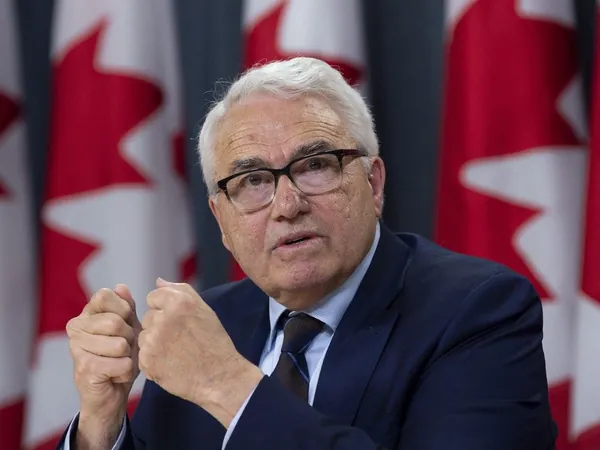
Under Siege: Quebec's Anglophone Community Struggles for Recognition and Rights
2024-10-09
Author: Sophie
Quebec's English-speaking community is facing significant challenges that threaten its very existence, according to a recent report from Canada's federal language watchdog. Raymond Théberge, the official languages commissioner, highlighted in a 23-page document that the misunderstanding of this minority community's status and rights is rampant.
"For several years, the English-speaking minority in Quebec has been facing challenges that are threatening its vitality,” Théberge stated. “First, its legitimacy as an official language minority community is all too often questioned. There seems to be confusion between the majority status of the English language in Canada and the minority status of the English-speaking communities in Quebec.”
The report arrives shortly after Théberge supported the legal fight against Premier François Legault’s controversial plan to eliminate English school boards. This move has alarmed community leaders who argue that it could further marginalize their already vulnerable community.
Théberge also expressed concerns over skyrocketing tuition fees for out-of-province students at English-language universities in Quebec, arguing that these policies exacerbate the linguistic divide and endanger the community's future. He emphasized that these institutions play crucial roles not just in preserving English education but also in elevating the French language and culture.
The report shines a light on various obstacles faced by the English-speaking population in Quebec, including recent actions by the Legault government that undermine their rights. These include banning religious symbols among government workers and imposing new restrictions on English usage through amendments to the Charter of the French Language, known as Bill 101.
Despite the portrayal of Quebec’s anglophones as a privileged elite, the report uncovered significant economic disparities. English-speaking Quebecers experience higher unemployment rates and lower median incomes than their French-speaking counterparts, often finding themselves living below the poverty line.
Access to healthcare services is also a pressing issue; Théberge noted a previous Quebec government directive that created confusion about English-language healthcare access. Although a new directive reaffirmed the importance of bilingual service, the commissioner stressed that "when Canadians need health care... they must be able to communicate clearly and quickly with health-care providers."
Culturally, the situation is equally troubling. The report indicates that funding for English-language cultural organizations has drastically decreased, creating a disparity that undermines the community's contributions to Quebec's rich tapestry of artistic expression.
The Quebec Community Groups Network welcomed the report's findings, indicating that they align with long-held sentiments within the anglophone population. "We are not the enemy of the French language in Quebec," said QCGN president Eva Ludvig, asserting that the English-speaking community is a vital part of the province’s ecosystem, calling for true collaboration rather than division.
As the tensions continue to rise, the community faces a pivotal moment. Will they stand unified in their quest for recognition and rights, or will the pressures of language politics push them further towards the margins? It remains to be seen how this complex narrative will unfold in the months and years to come.
Stay tuned for updates as this story develops!









 Brasil (PT)
Brasil (PT)
 Canada (EN)
Canada (EN)
 Chile (ES)
Chile (ES)
 España (ES)
España (ES)
 France (FR)
France (FR)
 Hong Kong (EN)
Hong Kong (EN)
 Italia (IT)
Italia (IT)
 日本 (JA)
日本 (JA)
 Magyarország (HU)
Magyarország (HU)
 Norge (NO)
Norge (NO)
 Polska (PL)
Polska (PL)
 Schweiz (DE)
Schweiz (DE)
 Singapore (EN)
Singapore (EN)
 Sverige (SV)
Sverige (SV)
 Suomi (FI)
Suomi (FI)
 Türkiye (TR)
Türkiye (TR)